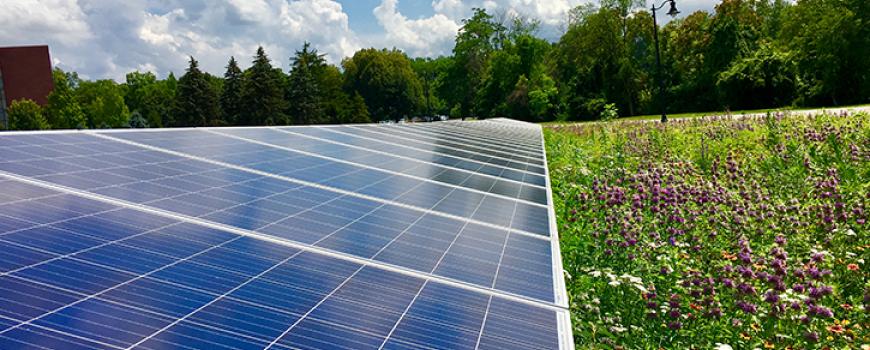March 27 - Fourth Sunday in Lent
The Marianist-sponsored University of Dayton planted one of Ohio's first "solar prairies." Learn more about that effort here.
“For over 70 years economics has been fixated on GDP, or national output, as its primary measure of progress. That fixation has been used to justify extreme inequalities of income and wealth coupled with unprecedented destruction of the living world. For the twenty-first century a far bigger goal is needed: meeting the human rights of every person within the means of our life-giving planet.” - Kate Raworth, Doughnut Economics: Seven ways to think like a 21st-century economist.
Our Lenten journey through the Laudato Si Action Platform (www.laudatosiactionplatform.org) continues as we strive to contemplate our role in caring for all of God’s creation. From now through Easter, a different Platform goal will be highlighted each week. Let’s continue our journey this week through the desert.
Goal: Ecological Economics
Ecological Economics acknowledges that the economy is a sub-system of human society, which itself is embedded within the biosphere–our common home. Actions could include sustainable production and consumption, ethical investments, divestment from fossil fuels and any activity harmful to the planet and the people, supporting circular economies, and prioritizing care labour and protecting the dignity of workers.
Reflection
Today we hear the story of the prodigal son who squandered his inheritance on worldly happiness. Ecological economics invites us to consider the costs of our own pursuit of happiness, especially the costs to God’s creation that cannot be measured in dollars. No matter what we buy, there is an environmental and social impact of all of our purchases like new clothes or electronics or toys. Then, when we finish with the item, there is an additional cost to the environment when we throw it away. Do you consider the true cost to the world before you purchase that new thing? Do you think about the materials and labor and transportation required to get the item to you? What about the pollution and energy use that every step in the manufacturing process requires? Have you considered the conditions and dignity of the workers who made the thing for you? What happens to the thing when you are finished with it? The ecological economics goal invites us to recognize the systems in our society that power the engine of consumerism and to advocate to ensure that all people and all of creation are treated justly. Let’s all strive to avoid squandering what we have received, and, like the prodigal son, seek reconciliation with all of God’s creation.
Challenge
When you buy something this week, pray for all the people and resources that went into getting it to you. If it’s an article of clothing, think of the farmers who grew the cotton, the textile workers who sewed the fabric together, the warehouse workers who sorted and stacked, the shipping workers who transported the item to you, and consider what happens to it when you finish wearing it. If it’s an electronic device, think of the miners who extracted the materials from the ground, the factory workers who assembled the equipment, the shipping workers who transported it to you, and where it goes when it doesn’t work anymore. If it’s a cup of coffee, think of the farmers in the mountains who grew the beans, the processors who roasted and bagged them, the transportation workers who moved them to your favorite coffee shop, the barista who brewed it for you, and what will happen to that paper cup when you finish drinking and throw it away.
Prayer
God of justice and compassion, whose light shines into our hearts and into our nation’s halls of power, strengthen our faith as we acknowledge the enormity of our task: to include all in the prosperity of this land.
We pray for your spirit of generosity in challenging greed and neglect. Give us your grace to reach out to the lowest paid workers, families subsisting on meagre incomes, people who are homeless, the dispossessed First Peoples of this land, so that we may achieve change, inspired by the Gospel, that leads to human flourishing.
We pray for your spirit of truth as we place our own economic choices before you, reflecting on our own motives as we strive to give and to keep, to save and to spend, to invest and to speak out in ways that honour every human being.
We pray for your spirit of fierce love and determination as we seek to assist and empower the most vulnerable, to create jobs and opportunities where they are most needed, to build an inclusive economy that enables government and business to champion a society where justice and equity abound.
May we be instruments of your compassion as we take up the needs of the poor, May we be instruments of your mercy as we bring truth to greed and neglect, May we be instruments of your creative spirit as we seek to make our world anew. In Christ and through the Spirit we pray.
- Australian Catholic Social Justice Council
Going Further
Watch a Ted Talk by the author of Doughnut Economics here.
Also, check out the new text Cathonomics: How Catholic tradition can support a more just economy by Anthony M. Annett, published by Georgetown Press. 2022.




